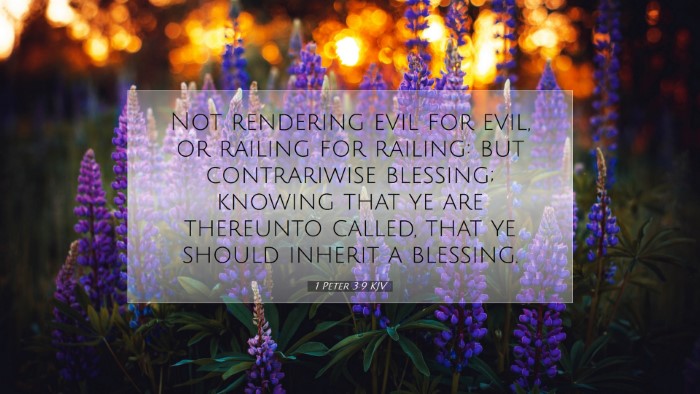Old Testament
Genesis Exodus Leviticus Numbers Deuteronomy Joshua Judges Ruth 1 Samuel 2 Samuel 1 Kings 2 Kings 1 Chronicles 2 Chronicles Ezra Nehemiah Esther Job Psalms Proverbs Ecclesiastes Song of Solomon Isaiah Jeremiah Lamentations Ezekiel Daniel Hosea Joel Amos Obadiah Jonah Micah Nahum Habakkuk Zephaniah Haggai Zechariah Malachi1 Peter 3:9
1 Peter 3:9 KJV
Not rendering evil for evil, or railing for railing: but contrariwise blessing; knowing that ye are thereunto called, that ye should inherit a blessing.
1 Peter 3:9 Bible Commentary
Commentary on 1 Peter 3:9
Verse: "Not rendering evil for evil, or railing for railing: but contrariwise blessing; knowing that ye are thereunto called, that ye should inherit a blessing."
Introduction
The Apostle Peter, in addressing the early Christian community, emphasizes the ethical conduct expected from believers, particularly in the face of suffering and persecution. This verse succinctly encapsulates a key principle of Christian behavior: the call to respond to evil not with retaliation, but with blessing and grace.
Theological Insights
1. The Call to Non-retaliation
Peter begins with a prohibition against rendering evil for evil. This admonition resonates with the teachings of Jesus, who instructed His followers to turn the other cheek and to love their enemies (Matthew 5:39-44). Such a response is grounded in the understanding that true Christian witness can often provoke hostility, but believers are called to reflect the character of Christ, who suffered without sinning.
2. The Ideal of Blessing
Contrary to the natural human instinct to retaliate, Peter exhorts the faithful to respond with a blessing. This notion of blessing implies wishing well upon others, even those who may cause harm. Clarke notes that to "bless" in this context means to invoke God’s favor upon others, demonstrating an attitude of love that transcends personal grievances.
Commentary Insights
From Matthew Henry's Commentary
Matthew Henry reflects on the principle of non-retaliation as central to Christian conduct. He highlights the idea that yielding to evil, rather than reciprocating it, can serve as a powerful testimony to the grace of God in a believer's life. Henry emphasizes that enduring hardship without seeking revenge not only fulfills the teaching of Christ but also reinforces the believer's character in the eyes of the world.
He further elaborates on the purpose of this conduct: it is a demonstration of one's calling. Believers are highlighted, according to Henry, as those who inherit a blessing, which reaffirms their identity as children of God. This intrinsic motivation—seeking to act in accordance with their divine heritage—encourages Christians to embody a life characterized by grace and mercy.
From Albert Barnes' Notes
Barnes emphasizes the distinction between the natural human reaction to evil and the supernatural response expected from believers. He articulates that in a society often governed by the principle of 'an eye for an eye', Christians stand apart by promoting peace and reconciliation. This shift reflects the transformative power of the gospel, capable of reshaping attitudes towards personal conflict.
He also notes that the call to bless those who wrong us aligns with scriptural examples from the Old Testament (e.g., Proverbs 25:21-22), where kindness to enemies is ultimately a way to invoke God's favor upon them. Thus, this intrinsic connection between blessing one's adversaries and provoking divine intervention highlights the depth of Christian ethics.
From Adam Clarke's Commentary
Clarke's analysis delves into the practical implications of this precept. He echoes the sentiment that responding to slander or aggression with kindness is not just a suggestion but a crucial aspect of living a Christian ethic. Clarke suggests that this behavior can have significant spiritual ramifications, possibly leading to the conversion of those who oppose the faith.
Moreover, Clarke emphasizes that this call to blessing is not merely a personal good but is framed as a communal directive. The body of Christ is encouraged to support and uplift one another, fostering a culture of grace that stands in stark contrast to the hostility often present in the secular world.
Practical Application
For pastors and theological students, 1 Peter 3:9 serves as a critical teaching point on Christian ethics, particularly in sermons and teachings about conflict resolution and interpersonal relationships. The reflection on how to navigate personal hurt and societal injustice through a lens of grace provides rich material for both personal growth and congregational teaching.
Scholars and theologians might explore this verse's implications within the broader framework of ethical theology, examining how the call to bless enriches discussions on divine justice and mercy. This exploration can also encompass the role of community in practicing these principles, emphasizing the need for collective grace and support among believers.
Conclusion
1 Peter 3:9 encapsulates a profound ethic for Christian conduct, emphasizing a radical response to wrongdoing. By modeling behavior that reflects Christ's teachings, believers not only honor their calling but also witness to the transformative power of faith. The insights from the commentaries of Henry, Barnes, and Clarke offer valuable perspectives that challenge us to embody these principles in our daily lives, fostering a community characterized by enduring love and grace.


